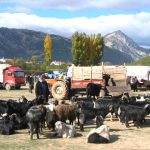The son of an Islamic scholar, Celaladdin Rumi (1207-1273) is better known to the world as Mevlana. A sufi, or Islamic mystic, Rumi was the author of a number of influential religious works, including the Mesnavi that sets out the beliefs he developed over a lifetime. But Rumi is even better known as the father of the whirling dervishes, the sect that uses music and dance as a way to bring ts devotees closer to Allah. Every year Konya remembers the death of Mevlana on 17 December (Şeb-i Aruz) with a week of celebrations in which displays of dervish dancing are the centrepiece.
The story of Mevlana contains all the elements of an exotic fairy tale, with heroes and villains galore. Born in 1207 in Balkh in what is now Afghanistan, he was forced to flee with his family to Mecca in Saudi Arabia as marauding Mongols poured into his homeland. From Mecca, the family migrated through the Middle East until eventually they reached Konya in 1228.
In those days the city was riding high as the capital of the Selçuk Sultanate of Rum, which had grown up as a successor state to the Great Selçuk Empire as that fell apart in the 12th century. Mevlana became a student of theology in what is now Syria, but by 1240 he had settled permanently in Konya where, in 1244, he met Şemsi Tebrizi who had studied Muslim mysticism under his father. Tebrizi developed such a powerful influence over Mevlana that his other disciples became jealous and are believed to have had him murdered in 1247. This was the signal for Mevlana to retreat from the world and begin writing the poetry that became the Mathnawi (Mesnevi) and the Divan-i Kebir.
Along the way, Mevlana also developed the notion that slowly rotating in circles for extended periods of time could bring people into mystical union with Allah; these days most visitors to Turkey will be familiar with the idea of the whirling dervishes, their white robes representing their shrouds and their soaring brown felt hats representing their tombstones. At the same time it was Mevlana who came up with what must surely be one of the most wonderful pieces of religious poetry even written: ‘Come, whoever you may be; even if you may be an infidel, a pagan or a fire-worshipper, come. Ours is not a brotherhood of despair. All who enter will receive a welcome here.’

